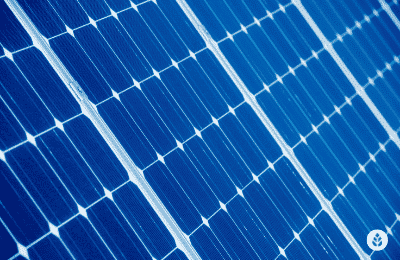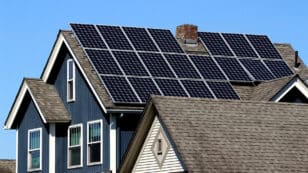
Solar Panel Cost in Texas (2024 Local Savings Guide)
In this guide to determining solar panel costs in Texas, you’ll learn:
- What is the average cost of a solar system in Texas?
- How much can you save by switching to solar energy in Texas?
- What incentives are available to help lower the cost of solar panels in Texas?
Each product and or company featured here has been independently selected by the writer. You can learn more about our review methodology here. If you make a purchase using the links included, we may earn commission.
How Much Do Solar Panels Cost in Texas?
Thanks to the growing investment in renewable energy technology statewide, homeowners have access to a below-average cost of solar in Texas, making going solar in Texas worth it! The average cost of solar panels in Texas is $3.18 per watt, which is lower than the U.S. average of $3.33 per watt.
In Texas, the average solar system costs $36,570 before the federal solar tax credit. After applying the 30% tax credit, Texans spend an average of $25,599 on their solar panels. The total cost of Texas solar panels depends on system size, energy needs and type of solar panels installed, so this price can fluctuate based on your unique needs.

Blue Raven Solar
Pros
- Industry-leading in-house financing
- Competitive pricing
- Excellent reputation
Cons
- Doesn't offer solar batteries (coming 2022)

Freedom Solar Power

Regional Service
Average cost
Pros
- Outstanding customer service
- Representatives are experts on local policies
- Great warranty coverage
- Offers products from leading manufacturers
Cons
- Expensive
- Limited service offerings
- No leases or PPAs

Momentum Solar
Pros
- Great warranty coverage
- Concierge service ensures steady communication
- Representatives are experts on local policies
Cons
- Slightly limited service offerings
- Only available in 11 states
The chart below includes the average cost of home solar energy systems in Texas based on the most common sizes in your area. The prices reflect the total cost after the federal tax credit is applied.
Though this data reflects the statewide averages, you’ll need to contact a solar installer near you to get an accurate quote for your home. We recommend you get free quotes from multiple companies and compare them to Texas solar averages to make sure you receive the best value possible. As you compare quotes, keep in mind that the largest solar providers in your area won’t always have the best prices.
How Does the Current Cost of Solar in Texas Compare to the National Average?
At $3.18 per watt, Texas residents pay less than the national average of $3.33 per watt. However, Texans often find themselves paying more for a solar energy system than other U.S. residents as a result.
The average solar system cost in the U.S. is around $29,970 before incentives or $20,979 after the federal solar tax credit. In Texas, homeowners often pay $36,570 for their solar systems before the federal credit or $25,599 after it’s applied.
This higher cost is due to the solar system size needed to offset energy costs in Texas homes. Most Texans need an 11.5 kilowatt (kW) system, whereas the average size of a U.S. solar system is about 9 kW. Of course, the system you need will depend on your energy consumption, so the size and cost of your solar system will vary.
Watch Below: How Much Should You Expect to Pay for Solar in Texas?
How Are Solar Costs Trending in Texas?
With 20,028 megawatts (MW) of solar installed to date, Texas has claimed the number two spot in the country for total solar installed.1 According to the Solar Energy Industries Association, Texas plans to install 38,523 MW or more of solar over the next five years and is expected to overtake California as the number one state in the country for solar.2
From September 2021 to September 2022, the price of energy has risen by 21.7% in Texas and the state’s electricity rates have increased by 30.7%.3 Texas homeowners have likely seen a rise in their electric bills due to these spikes. However, solar energy has quickly become one of the more accessible ways to combat these ever-increasing costs.
In the last 10 years, the cost of going solar in Texas has decreased by 53%, making solar power systems more accessible in Texas for all to combat increasing energy bills.4 More than 250 solar companies currently operate in Texas, so you have the opportunity to compare multiple solar quotes to get the best price for your home.
Texas may not be one of the top states for state incentives, but the Lone Star State’s utility companies have stepped up to the plate to offer benefits for solar customers. Many utility companies, such as CPS Energy and Austin Energy, offer net metering opportunities for excess energy production as well as cash rebates. So Texas residents can still receive helpful financial incentives alongside the federal investment tax credit to cover installation costs.
How Much Can You Save By Going Solar in Texas Today?
With Texas electricity rates on the rise and the cost of solar panels declining, there has never been a better time to go solar. Installing solar panels will not only help you save money on utility bills and lighten the world’s heavy load on the electric grid. It will also help you promote energy independence so you can stop relying on energy providers for your electricity needs.
The three most common solar financing options are cash purchases, solar loans and solar leases, also known as power purchase agreements (PPAs). We will explore the advantages and disadvantages of each in the sections below.
| Solar Financing Option | Initial Cost | Payback Timeline | Est 25-Year Savings |
| Cash | $25,599 (after the federal credit) | *12 years | $32,651* |
| Loan | $0 | *14+ years | $28,500 |
| Lease | $0 | N/A | $6,000* |
*These are conservative estimates intended to represent base-level averages. In most cases, customers can see an even higher return on investment (ROI) and shorter payback periods.
Cash Purchase of Solar System
The best way to save money on energy and get the most out of your solar system is to purchase your solar panels in cash. Not only does a cash purchase offer the shortest payback period, but you will save more money over time because you aren’t paying interest as with a solar loan.
With a cash purchase, you own your solar system outright. That means that every kilowatt of electricity you produce goes towards your home energy consumption or credits towards future energy bills via net metering.
Although a cash purchase is the best way to get the most out of your solar panel system, not every homeowner has the ability to buy their system outright. In Texas, solar panel systems can cost upwards of $35,000. Even with the federal tax credit, this is a lot of money to pay upfront and is not always possible for all homeowners.
Pros of Cash Purchase
- You own your system
- You can claim the federal solar tax credit
- Provides the shortest payback period
- You pay the least amount over time
Cons of Cash Purchase
- High upfront cost
Solar Loan
Many Texas homeowners choose to pay for their photovoltaic (PV) systems with a solar loan because it often requires little money down, then you can finance the rest of your system with a monthly payment. Although some homeowners choose to put more money down on their solar panels to have a lower monthly cost, this is not necessary.
Solar loans can offer you some of the same perks as a cash purchase. Once you pay off your solar system, you will own the system outright, and you can benefit from the federal investment tax credit.
However, you will pay more for your solar panels in the long run because of accrued interest. For some Texas homeowners, this can add $10,000 or more to the total cost of your solar panels, even with the federal tax credit.
Pros of Solar Loans
- Often $0 down
- You can claim the federal solar tax credit
- You own your system
Cons of Solar Loans
- You pay more money over time due to interest
- Longer payback period compared to a cash purchase
Solar Lease
Unlike solar loans and cash purchases, you will not own your system if you go the solar lease route. With a solar lease, you essentially rent your solar system from an installer and can use the solar energy produced by the panels during that time. Although the cost per month for solar energy is often less expensive than electricity costs, you will still end up paying more over time with a lease than if you buy your system.
Because you do not own your solar system when you lease, the value of your home will not increase nor will you be able to claim the federal investment tax credit. Instead, the company that installed your panels will own the panels and be able to benefit from federal incentives.
With the increase in solar loan availability, solar leases and PPAs have become less popular. Most homeowners prefer to own their systems and take advantage of solar tax credits and other incentives. If you are among this group, then a solar lease is not your best option.
Pros of Solar Leases
- No maintenance
- Can still use clean, renewable energy to offset electricity costs
Cons of Solar Leases
- You don’t own your system
- You can’t claim the federal tax credit
- You’ll spend more money over time
Want to see how much it would cost to install solar panels on your roof? Use this solar calculator to estimate your expected savings.
How Do You Get the Best Solar Prices in Texas?
The total cost to go solar in Texas can be pricey, but there are several rebate programs available to help you make the switch to renewable energy.
Utilize Local Incentives Programs and Texas Homeowner Rebates
Utilizing Texas solar incentives is one of the best ways to save money on your solar panels. The state of Texas is a leader in solar, having already met its Renewable Portfolio Standard (RPS) goal of installing 10,000 MW of solar capacity by 2025.5 The Lone Star Star state continues to promote the use of renewable energy, however, and many energy providers currently offer incentives for their customers.
Before you buy your solar system, check with your utility provider about solar rebates. There are many local rebates available, including:
- Oncor Electric Delivery Residential Solar Program
- CPS Solar PV Rebate Program
- City of San Marcos Distributed Generation Rebate Program
- Austin Energy Residential Solar PV Rebate Program
- Austin Energy Value of Solar Program
- Garland Power & Light EnergySaver Solar Rebate Program
- Denton Municipal Electric (DME) Residential GreenSense Energy Efficiency Rebate Program
- CenterPoint Energy Residential and Hard-to-Reach Energy Efficiency Program
- CPS Residential Energy Efficiency Rebate Program
- City of Plano Smart Energy Loan Program
- AEP Texas North and Central Companies SMART Source Solar PV Rebate Program
- City of Sunset Valley PV Rebate Program
Claim the Federal Solar Tax Credit
Texas may not have any state-specific incentives, but you can still apply for the federal solar tax credit, which credits 30% of your solar system costs toward your federal taxes. The credit was set to end in 2024, but the Inflation Reduction Act reinstated the program in 2022 with the following rate schedule:
- The credit rate will be 30% for systems installed between 2022 and 2031
- The credit rate will drop to 26% in 2033
- The credit rate will drop to 22% in 2034
- The credit will no longer be available in 2035
The total cost that Texas homeowners pay for their solar systems — around $35,570 on average — drops to around $25,599 after the federal credit is applied.
It’s easy enough to claim this tax credit, but it can only be applied toward the amount you owe on your federal taxes. If you can’t take the entire credit for the year you install your solar panels, you can roll over the remainder to future tax bills for up to five years. We recommend talking to your financial advisor to make sure you take advantage of this incentive program.
Get an Energy Audit
Getting an energy audit on your home is the best way to understand how much energy you use on a given day. An energy audit will help you determine how to reduce your energy consumption and how to make energy upgrades so your home runs more efficiently.
It’s a good idea to get an energy audit before you choose your solar system size. Energy audits can help you save money on your energy costs so you can save money on solar. If you get a solar system that is too big for your home, you will likely produce too much energy and have excess at the end of the month. You can credit some of this energy toward future energy bills, but there’s no reason to pay for a bigger solar system if you don’t need one.
What Factors Affect the Cost of Solar Panel Systems in Texas?
The final cost of your solar panel system will primarily depend on the solar equipment, installer and payment option you choose. Net metering, solar rebate programs and the federal tax credit can also save you money, so make sure you take advantage of the solar incentives in Texas.
Solar Equipment
Similar to any home improvement project, the quality of materials you choose can impact your final bill.
The first consideration in choosing a solar panel is the power and efficiency required to offset your home’s electricity use. If you choose a more efficient model of solar panel, the pricier your installation will be.
Luckily for Texans, the state receives enough sunshine that you shouldn’t need the most powerful solar panels on the market to get the job done. Standard, more affordable panels are sufficient in most cases, meaning lower overall costs for the average Texan.
Another consideration surrounding your equipment: Texas has experienced prolonged power outages due to extreme weather in the past. If your area is vulnerable to extreme weather or blackouts, it’s worth considering a solar backup battery.
Solar batteries typically add $10,000 or more to a final estimate, but the cost of losing power under extreme conditions can make batteries a solid investment in your home’s security.
Further, if you’re worried about weather-related damages, you may want to opt for a warranty with extensive coverage. The brands with the best warranties also tend to be the most expensive, but the peace of mind can be worth the extra cost.
Solar Financing in Texas
Texas’ energy economy is decentralized, meaning no state-wide policies affect cost. Rather, the availability of policies like net metering and solar rebates is left up to the jurisdiction of cities, counties and individual electricity providers.
Many energy companies offer net metering to their customers, and all Texas residents are eligible for the federal solar credit. These incentives can help reduce the expenses that go into a solar installation.
Check with your municipality or electricity provider to learn more about local rebates or financing programs available in your area. Solar rebates can lower the cost of purchasing your solar PV system by 10%-20%.
Additionally, your county may offer Property Assessed Clean Energy lending (PACE) programs, which can provide affordable, long-term financing options to property owners looking to upgrade the energy efficiency of their homes.6
Texas Solar Installation Company
The solar industry in Texas is rapidly growing, meaning you have plenty of options for solar panel installers across the state. Strong competition between solar companies also means you can shop around to get the best deal. Check out our best solar companies in Texas guide to see our top picks.
The installer you choose will have a large impact on your bottom line. Each company offers a different estimate based on the depth of its services, quality of its equipment and costs of operation.
For example, national powerhouse SunPower installs state-of-the-art solar panels with industry-leading power and efficiency, backed by a fully comprehensive warranty and a nearly 40-year track record of dependability.
Yet, the costs associated with hiring a local mom-and-pop shop to install solar panels could be thousands of dollars less and offer insider knowledge of the best solar systems for Texas households. We recommend consulting with at least two or three companies to get a sense of the best price points and solar panels available in your area.
Additional Considerations and Costs
When you decide to install solar on your home, you have to make sure all your bases are covered. Below are some additional considerations and costs to be aware of when going solar.
- Permits: Most areas of Texas require a permit from your local city in order to install solar panels on your home. Your solar contractor should help you with this process. Ensure you obtain the correct permits when installing or repairing your solar panels, or else you are at risk of being fined for code violations.
- Interconnection: Most solar installations in Texas will require the approval of your electricity provider for both safety and your enrollment in your local net metering program (if applicable). It’s common for utility companies to charge a small fee for this service — expect it to range between $25 to $500, but in most cases, it will be around $150. Your solar installer will handle the paperwork.
- Warranties: Texas can experience severe weather, so a comprehensive warranty on your solar panel system may be a wise option. Consult with your solar provider to discuss available brands and warranty options. The brands with the best warranties may cost more than your average panel but are worth it, in our opinion.
- Homeowner Association (HOAs): Under Texas Property Code Section 202.010, HOAs cannot forbid or restrict a property owner from installing solar panels.
- Environmental Zoning: For residential solar installations in Texas, special zoning is not necessary.
Are There Any Maintenance Costs of Going Solar in Texas?
Solar panels are generally low maintenance after they’ve been installed. However, there are some maintenance costs that homeowners may have to pay to make sure their panels operate at maximum capacity.
Cost to Clean Your Solar Panels
If there is debris or anything on top of your solar panels, then your panels cannot access as much sunlight. If your panels cannot get sun, then they will not produce energy. You should examine your panels at least twice a year, but you should also check your solar panels after severe weather because high winds can drag debris across your roof.
It typically costs $200 to have your panels cleaned, but this price often depends on the total size of your solar panel system.
Cost to Repair Your Solar Panels
If your solar panels are damaged, you’ll want to get them repaired as soon as you can. The cost to repair a solar panel can cost anywhere between $100 and $500 in Texas, but the cost will depend on which brand of solar panel you have.
Before you pay the cost to repair your panels, you should check your warranties. Sometimes your warranty will cover certain damages, which means you will not have to pay out of pocket for the repairs.
Cost to Trim on Your Property
If you have too much shade over your solar panels, your panels will not produce enough energy to offset the cost of electricity in your home. Sometimes you may need to trim your trees or even cut them down to get the most optimal sunlight on your roof.
The cost to cut tree branches often depends on the size of the tree. Shorter 25-foot trees might cost you less than $500 but can easily exceed $1,000 if you have 50-foot or 75-foot trees.
Typical Costs of Solar Providers in Texas
The brand of solar panel you choose will have an impact on your home system’s power production, the size system you need and, of course, the price you pay to go solar in Texas.
The table below provides a quick comparison of relative prices for some of the best solar panel brands in Texas. These should help you figure out which brands are likely to fit into your budget and supply your home with the best clean energy.
| Solar Panel Brand | Average Cost Per Watt ($-$$$$$) |
| Canadian Solar | $$ |
| JA Solar | $$ |
| Mission Solar | $$ |
| Panasonic | $$ |
| Q Cells | $$ |
| REC | $$$ |
| Silfab | $$$ |
| SunPower | $$$$$ |
| Tesla | $$ |
| Trina Solar | $$$ |
If you are ready to see how much solar panels will cost for your Texas home, select one of our recommended providers below to receive a free, no-obligation quote.
Read More About Going Solar in Texas
- Best Solar Installers for Your Home in Texas
- Guide to Texas Solar Incentives
- Is Going Solar Worth It in Texas?
The cost information presented in this article is derived from a comprehensive analysis, incorporating data from multiple industry sources. The average cost per watt per state was calculated based on figures from Consumer Affairs, Energy Sage, and Berkeley Lab’s Electricity Markets & Policy Department. Additionally, monthly energy consumption and the average monthly cost of electricity were sourced from the U.S. Energy Information Administration, ensuring a well-rounded and accurate representation of the information presented.
FAQ: Texas Solar Panel Costs
At EcoWatch, we’re happy to get questions about the process and costs of getting rooftop solar from Texas residents. Below are some of the questions we see most often, along with our responses. If you have specific questions that aren’t answered here, reach out to our team of solar experts at solar@ecowatch.com.
The average cost of solar panels in Texas is $3.18 per watt, which means a typical 11.5-kW system would cost around $25,599 after the federal solar tax credit. This is slightly above the national average due to the resource availability in Texas, current energy costs and the state’s available sunlight.
Solar panels increase home value everywhere, but mostly in areas with generous net metering policies and solar rebates. As such, the proportion at which solar panels increase home value in Texas corresponds with the areas with the most solar-friendly policies.
On average, you will need between 17 and 32 panels to power a 2,500-square-foot home. As you may have noticed, this is quite the range for Texas homes. Texas does experience an average of around 204 sunny days per year, which sits around the U.S. average of 205 days.
Due to this average sunlight, many Texas homeowners may opt for higher efficiency solar panels and need fewer total panels to power their homes. But if you choose less efficient solar panels, you will need more to offset energy costs.
Though knowing the size of a house helps determine how many solar panels could fit on its roof, the energy use of the house is the more important factor in determining solar panel quantity and cost in Texas. The higher your energy use, the greater your solar needs will be.
Related articles
Top Solar Installers in Texas Cities
Comparing authorized solar partners
-
- Industry-leading in-house financing
- Competitive pricing
- Excellent reputation
- Doesn't offer solar batteries (coming 2022)
A+Best Solar Financing2014Trina Solar, Canadian Solar, SolarEdge, Silfab, SunPower25-year manufacturer warranty; 10-year workmanship warranty, 2-year production guarantee
Having trouble deciding? Click below and use our process to receive multiple quotes instead:

 233k
233k  41k
41k  Subscribe
Subscribe 








